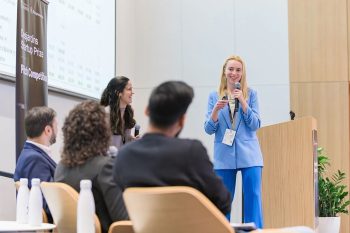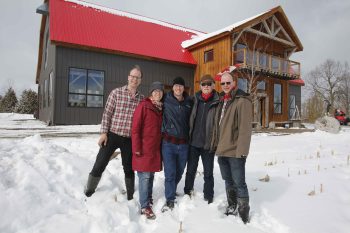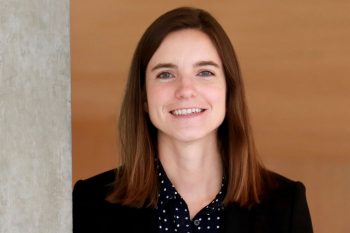Four U of T Engineering graduate students have earned 2021 Cecil Yip Doctoral Research Awards.
The annual awards celebrate first-year graduate students in the Donnelly Centre for Cellular & Biomolecular Research who engage in interdisciplinary research to advance discovery, medicine and health.
They were established in 2015 by the family of late Professor Cecil Yip, former Vice-Dean of Research at the Faculty of Medicine and co-founder of the Centre as a global hub for discovery in biology. Their projects range from deepening our knowledge of how the genome works to tissue engineering and computational biology.
Mickael Dang (ChemE PhD candidate) researches eye damage caused by microbial infection of the cornea, which often leads to blindness. To improve on the existing treatment of frequent eye drops, Dang is combining polymer chemistry, pharmacology and mechanical engineering to create a new gel-like biomaterial, which can be infused with the antimicrobial drug and implanted into the retina for longer-lasting therapeutic effects. He is supervised by Professor Molly Shoichet (ChemE, BME) and is collaborating closely with Professor Gerry Fuller of Stanford University.
Arianna Skirzynska (ChemE PhD candidate) is also working in Professor Shoichet’s lab and is developing a tumour-mimetic hydrogel, which will be integrated into a digital microfluidics brain-on-a-chip platform to replicate the invasive behaviour of glioblastoma, the most aggressive type of brain cancer. The miniaturised platform will then be used to screen for drug compounds capable of limiting the invasion and tumourigenicity of glioblastoma cancer stem cells from patient-derived samples to prevent disease recurrence. She is collaborating with Professor Aaron Wheeler’s (BME) microfluidics group at U of T, and glioblastoma expert Dr. Peter Dirks at the Hospital for Sick Children in Toronto.
Heta Lad (BME PhD candidate) is on the quest to determine whether circulating factors in the blood contribute to muscle weakness in patients in the intensive care unit (ICU). Collaborating with U of T Professors Rafael Montenegro-Burke and Gary Bader, she will investigate ICU patient sera and their ability to induce weakness in human muscles in the dish, grown using a miniaturised platform previously developed by the lab. She is supervised by Professor Penny Gilbert (BME).
Carolina Chavez Madero (BME PhD candidate) is also supervised by Professor Gilbert and is applying the same “micro-muscles” platform to study how human skeletal muscle repairs itself in real time. Using optogenetics, where light is applied to switch molecular processes on and off, she is investigating how different molecular factors in muscle stem cells contribute to muscle renewal for regenerative medicine.
“I would like to offer my heartfelt congratulations to all the awardees of this well-deserved recognition,” says Christopher Yip, Dean at U of T Engineering, Principal Investigator at the Donnelly Centre and the chair of the award committee.
“Despite the complex challenges of the pandemic year, they have made huge strides in their projects and I wish them all the best as they continue along their journeys – so many inspiring and exciting research projects underway in the Centre.”
This story was originally published by the Donnelly Centre for Cellular & Biomolecular Research



